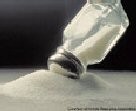Industry efforts to cut salt content appear wasted on consumers
The Food Standards Agency in Scotland (FSAS) has published research indicating that there has been no significant change in the amount of salt consumed by people in Scotland since 2006.
Yet it was in 2006 that the Food Standards Agency introduced voluntary salt reductions for industry across 85 categories of food, with a target of 2010. It then went on to set tougher revised goals for 2012, reducing again the target average or maximum amount of salt for particular foods.
Now attention seems to be shifting from food products to consumers eating out as the FSAS said: “Given the considerable efforts by industry to reduce the salt content of manufactured food products for home consumption, it is also necessary to address the salt content of foods eaten outside the home.”
When asked why food manufacturers should continue their efforts, in light of the results of the study, an FSAS spokeswoman told FoodNavigator.com: “We think it’s very good, all the work being done by the food manufacturers. That has helped because the results haven’t gone up.”
She added that the FSAS was working with caterers and extending its salt reduction drive, with further consumer engagement.
Excessive intake of dietary sodium is strongly linked to hypertension - a risk factor for the development of cardiovascular disease and stroke. Evidence also suggests links to gastric cancer, decreased bone density, and higher rates of obesity.
This has led to industry investing heavily in salt reduction strategies.
The new survey showed that people in Scotland were eating nearly 9g per day on average, which is 50 per cent higher than the recommended 6g per day.
The FSAS said the results were similar to a previous survey in Scotland in 2006 and also similar to the last UK survey in 2008.
The FSAS described work by the food industry to reduce salt content, as “very important” considering 75 per cent of salt consumed is in foods such as bread, meat products and cereals, as well as convenience foods.
It highlighter companies such as Baxters, which has reduced the average salt content of its soup by approximately 50 per cent since 2001, equating to 190 tonnes of salt per year.
There is also strong backing from the Scottish Government, including Scottish Enterprise funding to provide advice to companies on how to reduce salt, fat and sugar.
Yet the impact it is having seems minimal.
Charles Milne, FSA director, said: “We are disappointed that salt intakes have remained static, but will continue our efforts to help people reduce the amount of salt in their diets.”
The study involved taking a sample of urine collected over 24 hours. The 941 adults participating were aged 19-64 years, reflecting different gender, income levels and region of Scotland.






















